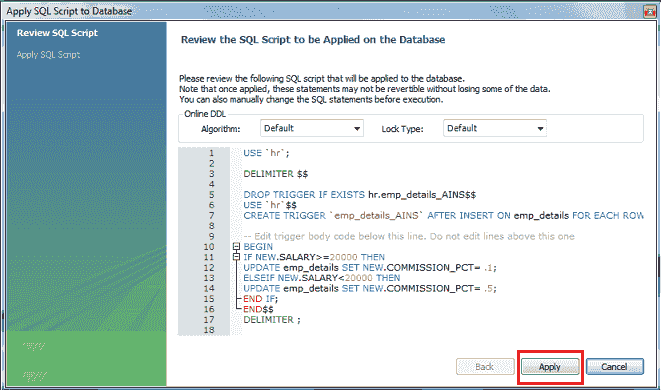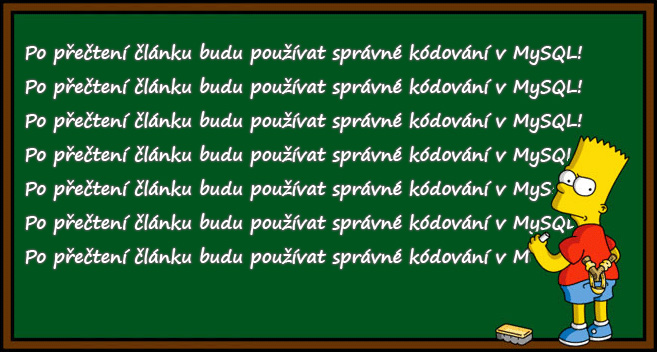Mysql Remove Case Sensitive
Posted By admin On 30.08.19This means database and table names are case sensitive in Unix and case insensitive in Windows. See section 1.7.3 MySQL Extensions to ANSI SQL92. NOTE: Although database and table names are case insensitive for Windows, you should not refer to a given database or table using different cases within the. Usually our mysql queries are not case sensitive. In order to query case sensitive, you can use the mysql COLLATE clause. The collate clause lets you specify a collation, which basically is a set of rules for comparing characters in a given character set. The suffixes ci, cs, bin of a collation stand for case insensitive, case sensitive and binary, respectively.
Moving a MySQL database from Windows to Linux I have the problem that on Linux the names of the tables are case sensitive. This is a problem, because the Java application that I am developing can't find tables.
I have changed my /etc/mysql/my.cnf file adding the row:
In Oracle, primary keys are case-sensitive, so if two values differ only in case they can be used as two different primary keys. In SQL Server, by default, primary keys are case-insensitive and when you transfer data from Oracle to SQL Server and then try to create the primary key constraints, you may have duplicate key errors.
lower_case_table_names=1
But that did not change anything.
My server version is:5.1.61-0ubuntu0.11.10.1 (Ubuntu)
How can I configure MySQL to ignore case in table names?
2 Answers
Just altering the lower_case_table_names setting isn't enough. It needs to be done before you import your database(s).
The MySQL 5.1 documentation lists a procedure for moving between Windows and Linux/UNIX. This will ensure that your desired rules for enforcing case sensitivity are followed. Take a look and verify that you did these steps in the correct order:
To convert one or more entire databases, dump them before setting lower_case_table_names, then drop the databases, and reload them after setting lower_case_table_names:
1 - Use mysqldump to dump each database:
mysqldump --databases db1 > db1.sql
mysqldump --databases db2 > db2.sql
.. Do this for each database that must be recreated.
2 - Use DROP DATABASE to drop each database.
3 - Stop the server, set lower_case_table_names in the [mysqld] section of your etcmysqlmy.cnf file, and restart the server.
4 - Reload the dump file for each database. Because lower_case_table_names is set, each database and table name will be converted to lowercase as it is recreated:
Mount and blade warhammer mod. Nov 23, 2018 Warsword Conquest is a total conversion of warbands mount and blade 1.153 based on the warhammer fantasy world by Games workshop and is single player only at moment.
mysql < db1.sql
mysql < db2.sql
AaronAaronFile in etc/my.cnfFind this # The MySQL server [mysqld]and set lower_case_table_names = 1
There is no need to drop db. It works so first check with this.Reason is default value of lower_case_table_names =1 for Windows.
Not the answer you're looking for? Browse other questions tagged mysqlmysql-5linuxmysql-5.1case-sensitive or ask your own question.
I have a function that returns five characters with mixed case. If I do a query on this string it will return the value regardless of case.
How can I make MySQL string queries case sensitive?
StevenBStevenB11 Answers
The default character set and collation are latin1 and latin1_swedish_ci, so nonbinary string comparisons are case insensitive by default. This means that if you search with col_name LIKE 'a%', you get all column values that start with A or a. To make this search case sensitive, make sure that one of the operands has a case sensitive or binary collation. For example, if you are comparing a column and a string that both have the latin1 character set, you can use the COLLATE operator to cause either operand to have the latin1_general_cs or latin1_bin collation:
If you want a column always to be treated in case-sensitive fashion, declare it with a case sensitive or binary collation.
drudgedrudgeThe good news is that if you need to make a case-sensitive query, it is very easy to do:
Craig WhiteCraig WhiteInstead of using the = operator, you may want to use LIKE or LIKE BINARY
It will take 'a' and not 'A' in its condition
Answer posted Craig White, has big performance penalty
because it don't use indexes. So, either you need to change the table collation like mention here https://dev.mysql.com/doc/refman/5.7/en/case-sensitivity.html.
OR
Easiest fix, you should use a BINARY of value.
Eg.
VS
1 row in set (0.00 sec)
To make use of an index before using the BINARY, you could do something like this if you have large tables.

The subquery would result in a really small case-insensitive subset of which you then select the only case-sensitive match.
Following is for MySQL versions equal to or higher than 5.5.
Add to /etc/mysql/my.cnf
All other collations I tried seemed to be case-insensitive, only 'utf8_bin' worked.
Do not forget to restart mysql after this:
According to http://dev.mysql.com/doc/refman/5.0/en/case-sensitivity.html there is also a 'latin1_bin'.
The 'utf8_general_cs' was not accepted by mysql startup. (I read '_cs' as 'case-sensitive' - ???).
You can use BINARY to case sensitive like this

unfortunately this sql can't use index, you will suffer a performance hit on queries reliant on that index
Fortunately, I have a few tricks to solve this problem
Excellent!
I share with you, code from a function that compares passwords:
No need to changes anything on DB level, just you have to changes in SQL Query it will work.
Example -
'SELECT * FROM <TABLE> where userId = ' + iv_userId + ' AND password = BINARY ' + iv_password + '';
Binary keyword will make case sensitive.
 Gaurav Jeswani
Gaurav JeswaniThe most correct way to perform a case sensitive string comparison without changing the collation of the column being queried is to explicitly specify a character set and collation for the value that the column is being compared to.
Why not use binary?
Using the binary operator is inadvisable because it compares the actual bytes of the encoded strings. If you compare the actual bytes of two strings encoded using the different character sets two strings that should be considered the same they may not be equal. For example if you have a column that uses the latin1 character set, and your server/session character set is utf8mb4, then when you compare the column with a string containing an accent such as 'café' it will not match rows containing that same string! This is because in latin1 é is encoded as the byte 0xE9 but in utf8 it is two bytes: 0xC3A9.
Why use convert as well as collate?
Collations must match the character set. So if your server or session is set to use the latin1 character set you must use collate latin1_bin but if your character set is utf8mb4 you must use collate utf8mb4_bin. Therefore the most robust solution is to always convert the value into the most flexible character set, and use the binary collation for that character set.
Why apply the convert and collate to the value and not the column?
When you apply any transforming function to a column before making a comparison it prevents the query engine from using an index if one exists for the column, which could dramatically slow down your query. Therefore it is always better to transform the value instead where possible. When a comparison is performed between two string values and one of them has an explicitly specified collation, the query engine will use the explicit collation, regardless of which value it is applied to.
Mysql Disable Case Sensitive Table Names
Accent Sensitivity
It is important to note that MySql is not only case insensitive for columns using an _ci collation (which is typically the default), but also accent insensitive. This means that 'é' = 'e'. Using a binary collation (or the binary operator) will make string comparisons accent sensitive as well as case sensitive.
What is utf8mb4?
The utf8 character set in MySql is an alias for utf8mb3 which has been deprecated in recent versions because it does not support 4 byte characters (which is important for encoding strings like 🐈). If you wish to use the UTF8 character encoding with MySql then you should be using the utf8mb4 charset.
mysql is not case sensitive by default, try changing the language collation to latin1_general_cs